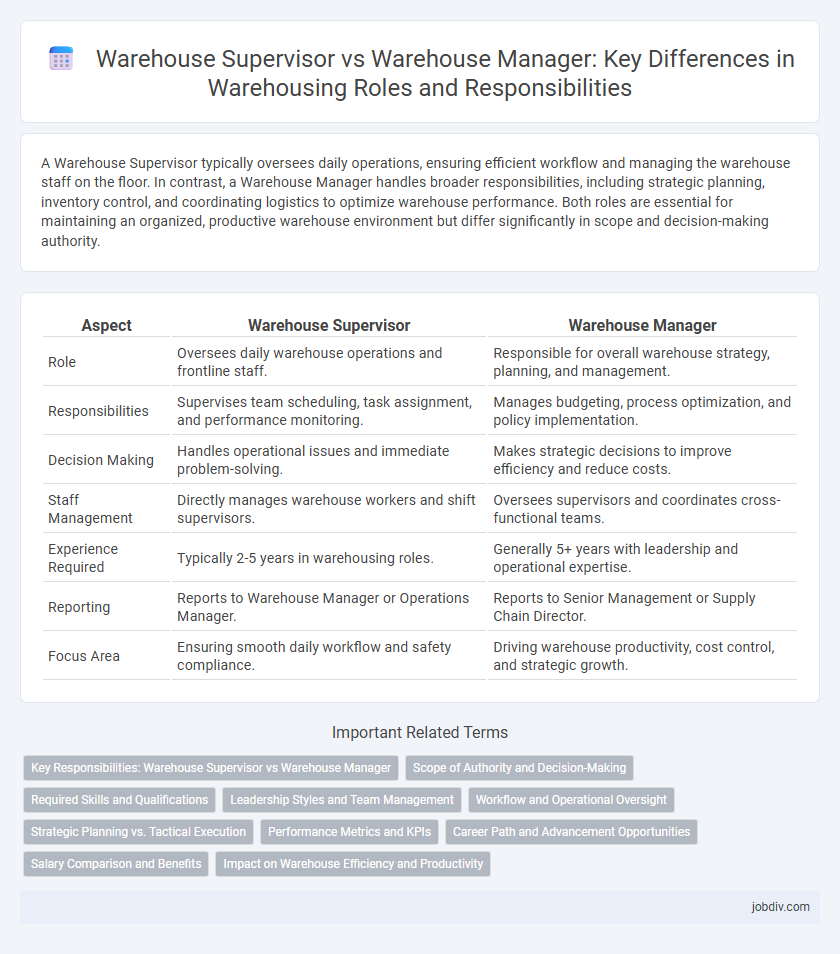A Warehouse Supervisor typically oversees daily operations, ensuring efficient workflow and managing the warehouse staff on the floor. In contrast, a Warehouse Manager handles broader responsibilities, including strategic planning, inventory control, and coordinating logistics to optimize warehouse performance. Both roles are essential for maintaining an organized, productive warehouse environment but differ significantly in scope and decision-making authority.
Table of Comparison
| Aspect | Warehouse Supervisor | Warehouse Manager |
|---|---|---|
| Role | Oversees daily warehouse operations and frontline staff. | Responsible for overall warehouse strategy, planning, and management. |
| Responsibilities | Supervises team scheduling, task assignment, and performance monitoring. | Manages budgeting, process optimization, and policy implementation. |
| Decision Making | Handles operational issues and immediate problem-solving. | Makes strategic decisions to improve efficiency and reduce costs. |
| Staff Management | Directly manages warehouse workers and shift supervisors. | Oversees supervisors and coordinates cross-functional teams. |
| Experience Required | Typically 2-5 years in warehousing roles. | Generally 5+ years with leadership and operational expertise. |
| Reporting | Reports to Warehouse Manager or Operations Manager. | Reports to Senior Management or Supply Chain Director. |
| Focus Area | Ensuring smooth daily workflow and safety compliance. | Driving warehouse productivity, cost control, and strategic growth. |
Key Responsibilities: Warehouse Supervisor vs Warehouse Manager
Warehouse Supervisors primarily oversee daily operations, including team coordination, inventory control, and ensuring safety protocols are followed within the warehouse floor. Warehouse Managers hold broader responsibilities such as strategic planning, budget management, and optimizing warehouse layout and processes to improve overall efficiency. Both roles require strong leadership and organizational skills, but Managers focus more on long-term goals while Supervisors manage immediate operational tasks.
Scope of Authority and Decision-Making
Warehouse Supervisors typically oversee day-to-day operations, managing staff schedules, inventory accuracy, and workflow efficiency within specific warehouse zones, with limited authority on strategic decisions. Warehouse Managers hold broader scope of authority, responsible for overall warehouse performance, budgeting, compliance, and implementing process improvements, making high-level decisions impacting the entire facility. Decision-making for Supervisors is mostly operational and tactical, while Managers engage in strategic planning and cross-departmental coordination.
Required Skills and Qualifications
Warehouse Supervisors require strong organizational skills, proficiency in inventory management software, and the ability to lead a small team to ensure efficient daily operations. Warehouse Managers need advanced leadership abilities, expertise in supply chain logistics, and a deep understanding of warehouse safety regulations to oversee large-scale operations and strategic planning. Both roles demand excellent communication skills and experience in warehouse technology, but managers typically hold higher qualifications such as a bachelor's degree in logistics or business management.
Leadership Styles and Team Management
Warehouse Supervisors typically employ hands-on leadership, directly overseeing daily operations and guiding staff through immediate tasks, fostering a collaborative team environment. In contrast, Warehouse Managers adopt strategic leadership, focusing on long-term planning, resource allocation, and performance metrics to drive overall warehouse efficiency. Effective team management in warehousing depends on blending the supervisor's tactical engagement with the manager's strategic vision to optimize workforce productivity.
Workflow and Operational Oversight
Warehouse Supervisors focus on overseeing daily workflow execution, ensuring tasks such as inventory handling, order picking, and staff coordination run smoothly on the floor. Warehouse Managers are responsible for broader operational oversight, including strategic planning, resource allocation, and process optimization across the entire facility. Effective warehouse management requires integrating both roles to enhance productivity and maintain efficient supply chain operations.
Strategic Planning vs. Tactical Execution
Warehouse Managers focus on strategic planning by developing long-term goals, optimizing supply chain processes, and ensuring alignment with company objectives. Warehouse Supervisors concentrate on tactical execution through daily operations management, workforce coordination, and real-time problem solving to maintain efficiency. Both roles are critical, with managers overseeing broader strategy and supervisors handling the immediate implementation of plans on the warehouse floor.
Performance Metrics and KPIs
Warehouse Supervisors typically focus on frontline performance metrics such as order accuracy, pick-and-pack speed, and employee productivity rates to ensure daily operational efficiency. Warehouse Managers analyze higher-level KPIs including inventory turnover, overall warehouse capacity utilization, and cost per order to drive strategic decision-making and long-term improvements. Both roles rely on real-time data analytics and automated reporting systems to monitor performance and optimize supply chain processes.
Career Path and Advancement Opportunities
Warehouse Supervisors typically begin their careers overseeing daily operations and team coordination, gaining hands-on experience that forms the foundation for advancing into managerial roles. Warehouse Managers hold broader responsibilities including strategic planning, budget management, and performance analysis, making their roles essential for career progression into senior logistics or supply chain management positions. Advancement opportunities often require acquiring certifications in logistics management and demonstrating leadership skills through successful team and process optimization.
Salary Comparison and Benefits
Warehouse Supervisors typically earn between $40,000 and $60,000 annually, whereas Warehouse Managers can command salaries ranging from $55,000 to $85,000, reflecting their broader responsibilities and strategic roles. Benefits for Warehouse Managers often include performance bonuses, comprehensive health insurance, and leadership development programs, while Supervisors usually receive standard health benefits and overtime pay. The salary and benefits disparity highlights the increased accountability and decision-making authority associated with managerial positions in warehousing.
Impact on Warehouse Efficiency and Productivity
Warehouse supervisors directly oversee daily operations, ensuring tasks such as inventory control, order picking, and staff coordination are executed efficiently, which leads to immediate improvements in workflow and productivity. Warehouse managers focus on strategic planning, resource allocation, and process optimization, enhancing overall warehouse efficiency by implementing long-term solutions like automation systems and performance metrics. Effective collaboration between supervisors and managers results in streamlined operations, reduced errors, and higher throughput, significantly boosting warehouse productivity.
Warehouse Supervisor vs Warehouse Manager Infographic

 jobdiv.com
jobdiv.com